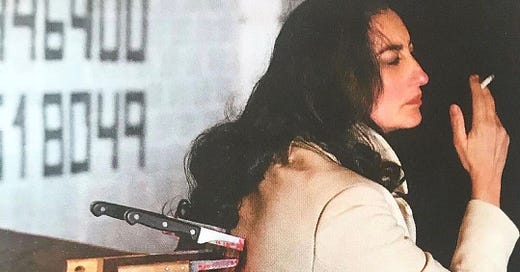What is they say about women’s rights? Weekly news
Today is the 15th of May, 2022. From MET Gala to abortion laws and domestic violence - news of the last 2 weeks were all about the women. Here’s a digest, and no yesterday’s visuals.

This text should have been written a week ago, but I chose to talk about fashion instead. Why? In my simulacrum there’s always something more important than that. Women rights - doesn’t matter, on their bodies or on their life and independence, or on something else - are so obvious and so never happen. We see MET Gala dresses, the curves rebellion. A statement about the new terms of appropriate dress code. More opened flesh, more sexual appeal. It should make me feel proud that we are free to show as much as we want. Instead I see just emptiness where used to be sense, challenge, boldness.
What I mean by that: I remember the time when dress was a statement, more than that it could be a reason to spend some time in a jail for disrespecting social norms. I remember the time when the dress was serving the women, not all the way around. Now we can wear everything or nothing and that won’t attract much attention. Lady Gaga and Rihanna proved that on numerous occasions, there’s nothing radical left. But…
The “slut” kind of dress (everyone has their own opinion on what it is exactly) can cause attacks on women even if people don’t suggest out loud the clothes are the reason. It’s just not politically correct to say such things anymore or to address the women’s shapes as provoking. At the same time many men and women still think that particular clothes on feminine forms provoke sexual aggression and justify it. In discussions on social platforms we still read that women are responsible for wearing garments that signalise “everything is allowed”. Such a twisted logic to blame not the abuser but the victim.
Women’s right on fashion
It’s widespread and the frequency of the complaints I get on Instagram each time I post an image with partial nudity or with suggestions of it just proves that point of view. The rule itself is a problem: people find nudity and open sexuality disturbing, dangerous and offending. But not when it’s about show business or cinema. So there were two major events that showed that contradiction in the USA society. One is the MET Gala, second is the Roe vs. Wade Supreme Court’s decision draft leaked to the press made it obvious that abortion right might become a privillage for many Americans. So American women are about to lose their rights to decide if they want to proceed with pregnancies, even if those put their lives in danger.
On one hand there’s the promoted image of strong women that rule the world, on another - the danger of losing the main right women have - on their body and on their future where they can decide to have or not to have children, to use birth-control pills and so on.
Let’s look at the first thing first. Did you notice how serious we became about the celebrities' choices and their thinking process behind that? Like we expect a written presentation from them with explanation why, what and when. And we completely forgot why they gather here or there. What is the purpose of the MET Gala? Surely it’s not for dressing and standing in front of the public like mules on sale. The ball was supposed to attract money for the museum. Donations. As far as there’s no information about the sums and success we can’t judge about the progress. What we can see is the crowd’s reaction to fashion. It’s not even about “who is who” anymore, only “who wears what and looks bad/nice”.
During the MET Gala no one found any gown “too much” dazzling, explicit or exaggerated, on the contrary, observers were very optimistic about the looks paying much respect to the diversity of the bodies and of the (bad?) tastes. The theme was “Gilded Glamour” - a nod to the museum’s exhibit “In America: An Anthology of Fashion”. The guests thought about everything truly American to represent. I wouldn’t ban those who came simply dressed, or who thought more about “gilded”, “glamour”, “in America” or “Anthology of fashion” as separate keywords not fully scripted dress code. It's not a masquerade after all. There were few vintage gowns, and European brands helped the stars out. Which, by the fact itself, says about American fashion and its history more than any particular piece of clothing that was ever made. So I wouldn’t dive into the history, associations and rightfulness of the choices. But if you want to hear justifications for looks, check the clips I’ve shared above and below.
Kim Kardashian, for example, tried to compete for the most authentic representation of American heritage - she wore Merilyn Monroe’s “Happy birthday, Mr. President” dress, which was sold in 2016 for $4.8 million.
Though she walked in it only till the show and changed into a replica, many people were concerned if the museum relic should be stressed that much and for such a reason. It was all about the discussion around the resurrection of that dress rather than about Kim’s look itself.Let’s look at the history of the dress.
I think the reminder about the original moment really serves the time, it lights up the question about what is inappropriate look, behaviour, and what is the woman’s body for the people’s judgments. And also what is the body for women right now, what is the beauty, the dignity, the price.
Women’s right on their bodies
My point of view is we can’t be that serious about how we look, how we sell our looks and completely forget to lose view on more important things - first of all, on where we are in terms of culture, common sense, rights, laws, morals and future perspectives. Fashion is used as a distraction from life as effectively as cinema, infotainment, television.
So let’s move to the second story, which is huge and restarted from the leak to the press as a discussion but historically it lasts for ages.
Supreme Court has voted to overturn abortion rights, draft opinion shows (Politico) - that’s the article that caused it all. I will quote only one sentence from there:
“The inescapable conclusion is that a right to abortion is not deeply rooted in the Nation’s history and traditions” (Alito’s words).
I wouldn’t use the “deeply rooted” term for a nation with 246 years of history. I think 50 years - ⅕ of it - is rooted deeply enough to have a few generations of women and men that don’t remember what it was like before abortions were legalised. But the whole statement connected not to biology, nature or to the core values of civilised society, but to the “Nation’s history and traditions” makes me worry. What can be less meaningful than that? History of the USA is represented by a history of immigrants who came from all over the globe in different times, and the sad fate of native Americans - the widest spread of traditions and cultures was set for coexistence on one ground in the spirit of tolerance to each other. And that doesn’t go smoothly till now.
So women's rights are now discussed again on the most basic level by men in power and the language they use is artificial, racially biassed and archaic. Stereotypes are as strong as ever but they are modified by propaganda and the perverse senses are accepted by people as they are without thinking through. Everything is based on the cancel culture dialogs - no one is heard, though you still can speak out to be rejected apriori for being out of the mainstream opinion. And what is the mainstream? It depends on what your community is - inside it will be one truth, outside - another. But is it up to the community to decide for a woman what to do with her body?
If you are concerned she wouldn’t be morally and mentally equipped enough to make a right decision then invest into education - for women and for men, because it takes two for the tango but only women should deal with its consequences. Invest into the mother-child care and health programmes as well, so women won’t worry they won’t be able to provide enough care for their children. Invest in social support for poor families. In all sorts of developing programmes for children. Make motherhood not just naturally wanted but also socially protected and supported and celebrated. But leave that choice to be or not to be a mother to women. It’s a personal choice.
I wish it was only the USA’s problem, but it’s not. Even in Europe there are countries where abortions are legally prohibited even when it’s the matter of the woman’s survival. The example of the USA can be used for the anti-abortion movements all over the world and delay possitive changes in the policies of many countries. That’s something that can’t be accepted. Women’s rights are still not obvious, unlike so called women’s “duties”, their “place” and “appropriate behaviour”. Everything that was artificially introduced into life by primal societies and by religions is out there for so long that even women can’t believe there’s something else for them that doesn’t include kitchen, bed and kindergarten.
So many things are denied for us - in many countries and cultures it’s a misfortune to be born a woman, it’s impossible to believe that the most civilised places on Earth are ready to go back in time to end up in the same position. For what? Why? So many approaches were invented only in America to make that regression possible.
Everything was prepared for the anti-abortion reginal laws and so many young women were converted into the “pro-life” movements. It’s understandable why they miss the point of “pro-life” propaganda (“The Battle Over the Future of the Anti-Abortion Movement if the Supreme Court Overturns Roe v. Wade”). The argumentation around the “God’s will” isn’t the dominating one anymore. It’s far gone from the religion and traditional values. All the contemporary social movements are in the polemics, built in there very precisely, including anti-racial and sexual tolerance campaigns.
If you want to learn more about the USA abortion regulation and the consequence of Roe’s fall:
Roe v Wade: Six things we learned from Supreme Court's abortion ruling (Telegraph)
Inside the hunt for Supreme Court leaker who triggered US abortion earthquake (Telegraph)
‘We will not go back’: thousands rally for abortion rights across the US (The Guardian)
Canada and Mexico prepare to accept Americans seeking abortions (The Guardian)
IVF treatment faces ‘clear and present danger’ from US anti-abortion effort (The Guardian)
Margaret Atwood accuses Supreme Court of bringing ‘Handmaid’s Tale’ to life (New York Post)
Roe vs Wade reversal would be ‘very damaging’ for economy, warns Yellen (Financial Times)
Black women face brunt of harm if Roe vs Wade abortion rights are repealed, warn experts (Financial Times)
Which states are reinforcing abortion rights? (The New York Times)
If Roe Falls, Is Same-Sex Marriage Next? (The New York Times)
Crypto Joins the Abortion Conversation (The New York Times)
Abortion Is a Business Issue (The New York Times)
Where Does the Abortion Rights Movement Go Next? Interview with Gloria Steinem (The New York Times)
The End of Roe v. Wade (WSJ)
American senators strike down a bill that would have codified abortion rights (The Economist)
Religion, not gender, is the best predictor of views on abortion (The Economist)
What happens if America’s Supreme Court overturns women’s right to abortion (The Economist)
Women’s rights on respect
I don’t see other explanations to the problems mentioned above as a total disrespect to each other. It’s not even the problem of men that don’t see women as equal to them. It’s also about women that think that some of them know better than others what is right and wrong. It is the problem of the public as a whole when it thinks it has a right to intervene into the personal relationships of two people and make things “right”, fix them collectively.
The most discussed social subject for the last couple of weeks was the court case about the domestic violence and abuse between Johnny Depp and Amber Heard. I don’t really want to get into the details of their marriage and I don’t want to know “the truth” of who hurt whom the most. It’s already obvious they both are guilty in all the stuff they committed against each other and continue to add more. What disturbs me the most is the public solidarity against Amber when a few years ago the same public was united against Depp. Then it was on the wave of “#metoo” movement and campaigns against violence against women, today what we see is a recession - “she was after his money, she used the situation, she plays the role”.
They both behave themselves ugly, but the media makes a story like there’s nothing more to discuss and to learn about. It programmes public opinion. We should form our point of view, they insist. Why? The only thing we can do is to let them decide their future in court, and learn to never be at their place and keep dignity as far from the public as possible.
I think that domestic violence is awful and all of the above could be avoided. Any form of abuse is unforgivable and can’t be excused not by terrible childhood, not by rage control issues or all sorts of addictions, and definitely not by the victim's behaviour. Domestic violence is systematic. It’s never about one time story, and it has a trend of escalation. I don’t see any way to contain it. But all the opportunities to condemn it when we recognise it.
Someone can say it’s a personal issue in a couple, it’s not up to us to intervene. Well, I’ve written myself the same words a few abstracts ago. It’s really not up to us to intrude the relationship, but it’s our opinion that approves or disapproves the abusers. It’s up to us to say that they are ugly, they can’t be accepted by society and they need help if they are struggling with rage control. We can stop abusers if they act publicly. We can show that we are not with them. It doesn’t matter what we think about them as professionals or personalities, their actions speak louder.
We shouldn’t explain such acts between us, because they are unacceptable. We wouldn’t stand such things addressed to us, strangers, why then do we excuse it when the victim is from the abuser’s family?
I know I haven’t even touched the violence problem right now, it’s huge. It’s painful. It’s also pretty personal for me, so I don’t even know how to start it and where to finish. I know that the worst part is dealing with it alone - face to face with an abuser. Even when there are people around. The worst part is that no one will come to help you and to defend you. Everything is even worse than that. You might see people shake hands with your enemy just after witnessing the ugly brutal scene. When you expect at least silence and awkwardness in the air there might be signs of cheering and approval. That happened to me in the middle of Europe in a fancy restaurant. Bon appetit, people.
Everything about violence is codified, including our language. We tend to skip the problem even when we read about it. Something should change. We scream about unprovoked war and freedom of speech and we are silent about things we witness everyday at home, on the streets, on TV, on social networks. Abusers that start the wars live among us. It’s as simple as that.
My platforms
Instagram: https://www.instagram.com/zakharova_kaetano
Twitter: https://twitter.com/olga_kaetano
Telegram: https://t.me/f_simulacrum
Tumblr: https://fashionistaru.tumblr.com
If you like F! Simulacrum and want to help make it even better, give me feedback, point out factual errors or typos, or send me news subjects you want to describe. My email: o.zakharova@adlifestudio.ru
Substack says you can now read my F! Simulacrum in the new Substack app for iPhone. And it will be easier and more comfortable.




